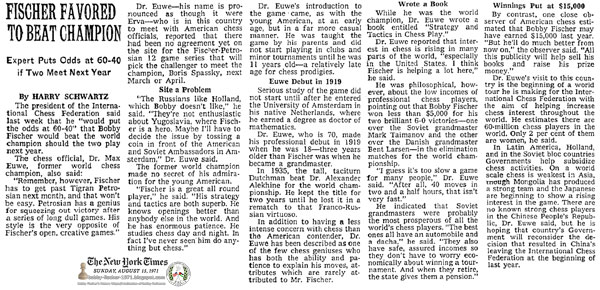New York Times, New York, New York, Sunday, August 15, 1971 - Page 92
Fischer Favored To Beat Champion: Expert Puts Odds at 60-40 by Harry Schwartz
The president of the International Chess Federation said last week that he “would put the odds at 60-40” that Bobby Fischer would beat the world champion should the two play next year.
The chess official, Dr. Max Euwe, former world chess champion, also said:
“Remember, however, Fischer has to get past Tigran Petrosian next month, and that won't be easy. Petrosian has a genius for squeezing out victory after a series of long dull games. His style is the very opposite of Fischer's open, creative games.”
Dr. Euwe—his name is pronounced as though it were Erva—who is in this country to meet with American chess officials, reported that there had been no agreement yet on the site for the Fischer-Petrosian 12 game series that will pick the challenger to meet the champion, Boris Spassky, next March or April.
Site a Problem -- “The Russians like Holland, which Bobby doesn't like,” he said. “They're not enthusiastic about Yugoslavia, where Fischer is a hero. Maybe I'll have to decide the issue by tossing a coin in front of the American and Soviet Ambassadors in Amsterdam,” Dr. Euwe said.
The former world champion made no secret of his admiration for the young American.
“Fischer is a great all round player,” he said. “His strategy and tactics are both superb. He knows openings better than anybody else in the world. And he has enormous patience. He studies chess day and night. In fact I've never seen him do anything but chess.”
Dr. Euwe's introduction to the game came, as with with the young American, at an early age, but in a far more casual manner. He was taught the game by his parents and did not start playing in clubs and minor tournaments until he was 11 years old—a relatively late age for chess prodigies.
Euwe Debut in 1919 -- Seriously study of the game did not start until after he entered the University of Amsterdam in his native Netherlands, where he earned a degree as doctor of mathematics.
Dr. Euwe, who is 70, made his professional debut in 1919 when he was 18—three years older than Fischer was when he became a grandmasters.
In 1935, the tall, taciturn Dutchman beat Dr. Alexander Alkehine for the world championship. He kept the title for two years until he lost it in a rematch to that Franco-Russian virtuoso.
In addition to having a less intense concern with chess than the American contender, Dr. Euwe has been described as one of the few chess geniuses who has both the ability and patience to explain his moves, attributes which are rarely attributed to Mr. Fischer.
Wrote a Book -- While he was the world champion, Dr. Euwe wrote a book entitled “Strategy and Tactics in Chess Play.”
Dr. Euwe reported that interest in chess is rising in many parts of the world, “especially in the United States. I think Fischer is helping a lot here,” he said.
He was philosophical, however, about the low incomes of professional chess players, pointing out that Bobby Fischer won less than $5,000 for his two brilliant 6-0 victories—one over the Soviet grandmaster Mark Taimanov and the other over the Danish grandmaster Bent Larsen—in the elimination matches for the world championship.
“I guess it's too slow a game for many people,” Dr. Euwe said. “After all, 40 moves in two and a half hours, that isn't very fast.”
He indicated that Soviet grandmasters were probably the most prosperous of all the world's chess players. “The best ones all have an automobile and a dacha,” he said. “They also have safe, assured incomes so they don't have to worry economically about winning a tournament. And when they retire, the state gives them a pension.”
Winnings Put at $15,000 -- By contrast, one close observer of American chess estimated that Bobby Fischer may have earned $15,000 last year. “But he'll do much better from now on.” the observer said. “All this publicity will help sell his books and raise his prize money.”
Dr. Euwe's visit to this country is the beginning of a world tour he is making for the International Chess Federation with the aim of helping increase chess interest throughout the world. He estimates there are 60-million chess players in the world. Only 2 per cent of them are women, he said.
In Latin America, Holland, and in the Soviet bloc countries Governments held subsidize chess activities. On a world scale chess is weakest in Asia, though Mongolia has produced a strong team and the Japanese are beginning to show a rising interest in the game. There are no known strong chess players in the Chinese People's Republic, Dr. Euwe said, but he is hoping that country's Government will reconsider the decision that resulted in China's leaving the International Chess Federation at the beginning of last year.























